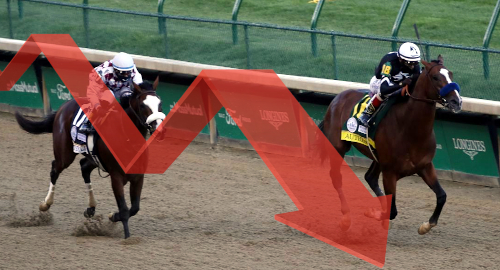 Betting on the Kentucky Derby was down by more than half from the previous year as the race went on without fans in the stands and without Nevada bookmakers contributing to the pari-mutuel pool.
Betting on the Kentucky Derby was down by more than half from the previous year as the race went on without fans in the stands and without Nevada bookmakers contributing to the pari-mutuel pool.
Betting operator Churchill Downs Incorporated (CDI) reported betting handle of $79.4m on Saturday’s 146th running of the Kentucky Derby, around 52% of the record $165.5m bet on 2019’s event. Handle on the overall 14-race card was down nearly 49% to $128.3m, the lowest total since 2002.
CDI blamed the decline on the fact that COVID-19, which kept the race from observing its traditional May timeline, also kept the stands at the Churchill Downs track free of spectators, who wagered $21.3m on-site at last year’s race. Betting also slowed due to Belmont Stakes winner Tiz the Law being an overwhelming betting favorite, although rival Authentic ended up claiming the crown by 1.25 lengths.
2020’s handle also suffered from a lack of Nevada bettors adding their wagers to the pari-mutuel pool. On Thursday, EPSN reported that Nevada sportsbooks were balking at CDI’s demands for a 5.5% charge on all wagers on its races, up from the previous rate of 4.5%, while seeking a 10.25% take on Derby weekend action.
CDI didn’t include statistics on how much of 2020’s Derby handle was wagered online via its TwinSpires advance deposit wagering site but the percentage was likely significantly higher than previous years due to ongoing capacity restrictions at many racetracks and the closure of OTB facilities in several states.
TwinSpires got a slight boost on Thursday after the Michigan Gaming Control Board authorized CDI and its local partner Northville Downs to accepts bets on live and simulcast pari-mutuel racing, including the Kentucky Derby. The track previously reached a similar deal with Flutter Entertainment’s TVG race betting brand.
New figures released via Equibase show nationwide race betting handle totaled $1.15b in August, around 2% below August 2019’s sum. That spoiled racing’s brief COVID comeback, which saw July’s handle rise 17% year-on-year to $1.1b.